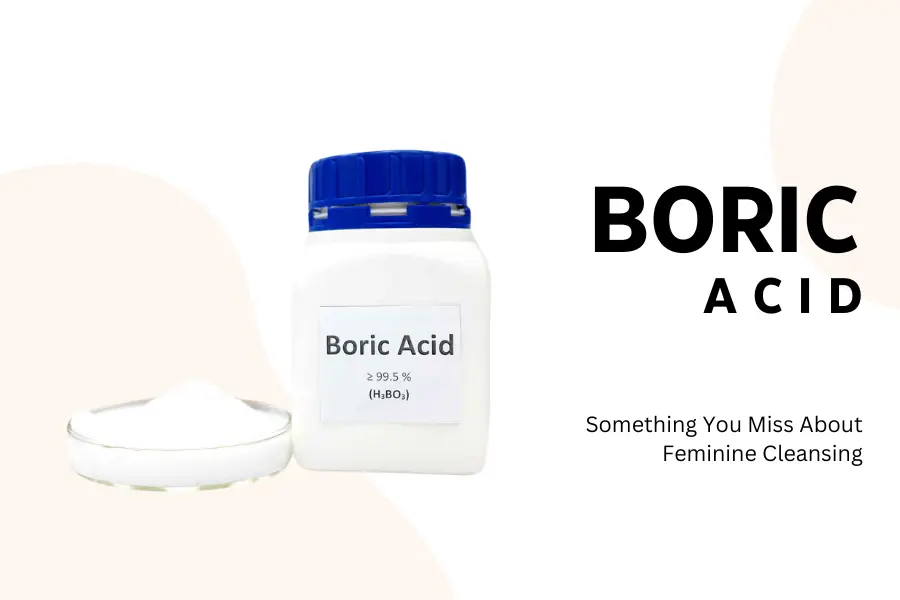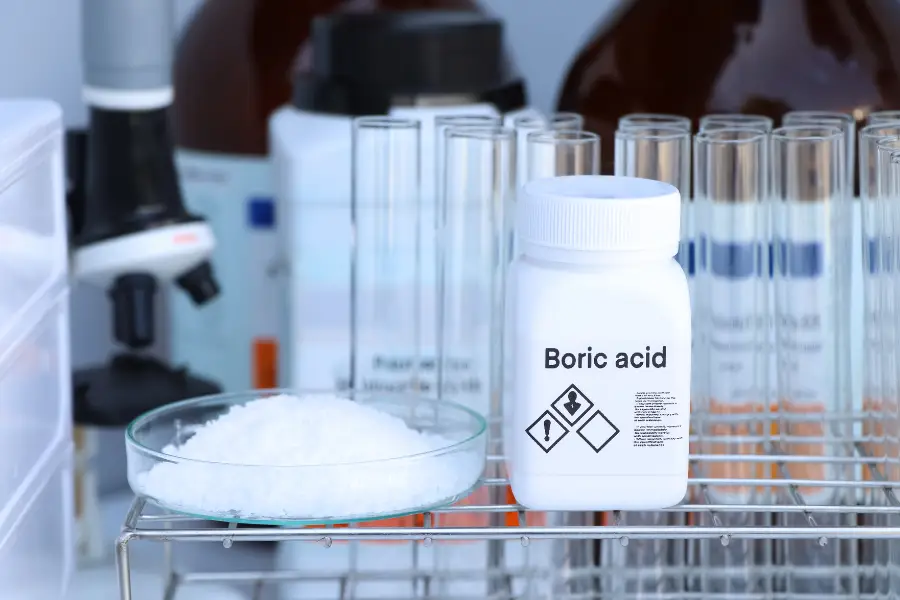
Boric acid is known as a versatile substance and is used in many daily life activities of humans. One of the applications of boric acid is to treat yeast infections and vaginal infections. Vaginitis is a disease that women are very susceptible to, especially pregnant mothers. However, is boric acid safe for pregnant women? In this article we will learn about boric acid and its effects on pregnant women.
What Is Boric Acid?

Boric acid, also known as Boron Acid, is a chemical compound with the formula H3BO3. It is a water-soluble chemical which could be found in nature and consists of boron, hydrogen and oxygen. Boric acid usually comes in the form of colorless crystals or white powder, is soluble in water and is weakly acidic. Boric acid has many applications in household, industry and medicine1. And in this article, we only mention the application of Boric acid in the medicine field for treating vaginal yeast infections.
What Problems Does Boric Acid Solve?
Human skin will contain a small amount of yeast and bacteria in locations such as the mouth, throat and vagina. Under healthy immune conditions, yeasts and bacteria will often benefit the area in which they exist. However, if the human body tends to worsen such as weakened immune or hormonal changes, yeast could multiply and lead to infection. And according to medicine, the cause of yeast infections is candidiasis. There are many types of candidiasis and in many areas. However, for women, especially pregnant women who usually change hormones, it often happens in the vagina.
Based on 14 studies (including nine cases, four case reports, and two randomized clinical trials), boric acid was compared with other types of antifungal medicine, researchers found that the rate of use of boric acid for mycologic treatment ranges from 40% to 100%. Moreover, no studies report large differences in yeast infection recurrence rates2. Therefore, boric acid has the ability to limit the growth of yeast, especially Candida albicans (C. albicans) or Candida glabrata (C. glabrata) and prevent infection.
In addition, using antibiotics to treat bacterial vaginosis can cure 70 to 80% in 1 month3. Although this is a very good result in the treatment of bacterial vaginosis, boric acid still needs to be studied further to confirm this as an effective treatment for vaginosis caused by bacteria.
Moreover, boric acid is believed to possess antibacterial and antifungal features. Diluted boric acid is used for curing skin problems such as
- Athlete’s foot
- Diaper rash
- Foot odor
- Insect bites
How To Use Boric Acid?
Women should make an appointment with their doctor to get a diagnosis to use boric acid suppositories or not. On the market, women can buy suppositories online or at the pharmacity.
If not, women are able to make their own capsules. The ingredients include boric acid powder and size 00 gelatin capsules. They put the boric acid powder into the gelatin capsule. Then, they will eliminate the excess powder from the top and close the capsule tightly.
Though they use either method, they have to use 600 milligrams a day and put suppositories into vagina for 7 to 14 days.
To put the suppository:
- Wash the hands carefully before taking the capsule out of the package.
- Can insert the suppository at any positions that they can insert and feel comfortable such as: lie on their back with bent knees or stand with your knees bent and the feet a few inches apart.
- Put the pill as deep as it can into women’s vagina.
- Should put on a pad onto underwear, because after putting the suppository, discharge could be .
- Wash the hands again after inserting the pill and before doing other daily activities.
- Make sure that women put the suppository right at the same time each day. Bedtime may be the best time for using it.
Here are some other small guides:
- Women probably feel better in 1 day, but women should complete the full course of medication to ensure that the infection doesn’t return.
- If women get a severe infection, ask for doctor’s advice and put on suppository twice a day between 7 and 14 days.
- If women have chronic or recurring infections, ask for doctor’s advice and put 1 capsule everyday into the vagina.
- In any case, please contact your doctor for advice and the most appropriate treatment for your case.
Benefits And Risks Of Boric Acid
In this section, there are some benefits as well as side effects that women who use boric acid may experience.

Benefits Of Boric Acid
- Safe and economical alternative to other treatments.
- May be effective against fungal strains that do not respond to conventional treatments, such as non-Candida albicans (non-albicans) and Azole-resistant fungi.
Risk Of Boric Acid
- Should be a secondary treatment after traditional treatments are ineffective. The traditional treatment is usually an oral antifungal medication (such as a dose of fluconazole) or a topical cream.
- Additionally, even boric acid is proved to be safe for adult women, there are some side effects such as4:
- burning at the insertion site
- watery discharge
- redness in the vaginal area
- If women suffer discomfort, stop using it. To be safe, women ask for advice from the doctor if your signs last even after ending treatment.
Cautions For Using Boric Acid
Boric acid should not be used if the patient is
- a fever
- a blood vessel disorder
- any sexually transmitted disease
- has an open wound in the vagina
- heart disease
- nausea
- vaginal bleeding
- pelvic inflammatory disease
And the most important thing is keeping boric acid out of children and animals, and never drink or swallow it. If anybody swallows it, contact the doctor or the nearest hospital to solve it.
Is Boric Acid Safe For Pregnant Women?

No, it is definitely not, boric acid is harmful to pregnant people. According to the American College of Obstetricians and Gynecologists, boric acid is not used for pregnant women. Although studies on the teratogenic effects (causing birth defects) of boric acid are uncertain, experiments on animals show that high doses of boric acid taken orally can cause birth defects. However, the dose of vaginal exposure to intravaginal boric acid may be much lower.
The ability of pregnant women to absorb IBA into the blood has not been clearly proved. Though pregnant and nonpregnant women may excrete boron (the main component of boric acid) at similar rates, other effects of pregnancy on the effects of intravaginal boric acid are unknown. Therefore, based on current studies, the recommendation against use of intravaginal boric acid during pregnancy cannot be changed5.
The Last Line
Boric acid is an extremely good active ingredient in treating vaginitis in women. However, it is not recommended for pregnant mothers to use. And boric acid must be permitted by a doctor and used with a prescription, but should not be self-administered or taken orally. Women make sure to keep boric acid away from children and pets in your home.
Sources
- Kumar, K. (n.d.). Boric Acid: Its Uses, Side Effects, and Poisoning Risks. MedicineNet. https://www.medicinenet.com/what_is_boric_acid_used_for/article.htm ↩︎
- Iavazzo, C., et al. (2011). Boric acid for recurrent vulvovaginal candidiasis: The clinical evidence. https://www.ncbi.nlm.nih.gov/pubmed/21774671 ↩︎
- Mullins MZ, et al. (2015). BASIC study: is intravaginal boric acid non-inferior to metronidazole in symptomatic bacterial vaginosis? Study protocol for a randomized controlled trial. DOI: https://dx.doi.org/10.1186%2Fs13063-015-0852-5 ↩︎
- Saindane, D., et al. (2013). Study of antifungal activity of boric acid on vaginal pathogens.
https://pdfs.semanticscholar.org/b676/98021a23ce66878a570d3013836827e59b1c.pdf ↩︎ - Mittelstaedt R, Kretz A, Levine M, Handa VL, Ghanem KG, Sobel JD, Powell A, Tuddenham S. Data on Safety of Intravaginal Boric Acid Use in Pregnant and Nonpregnant Women: A Narrative Review. Sex Transm Dis. 2021 Dec 1;48(12):e241-e247. doi: 10.1097/OLQ.0000000000001562. Erratum in: Sex Transm Dis. 2022 Jun 1;49(6):e78. doi: 10.1097/OLQ.0000000000001635. PMID: 34561373; PMCID: PMC10100571. ↩︎






